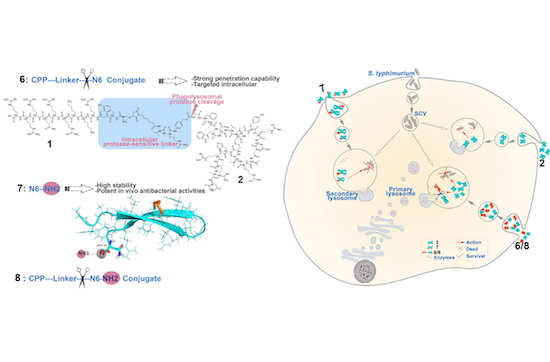Novel Antimicrobial Peptides to Control Intracellular Salmonella Infection in Livestock and Poultry
Recently, the “antimicrobial peptides (AMPs) & antibiotic to substitutes (ATA)” group led by Prof. Wang Jianhua from Feed Research Institute of Chinese Academy of Agricultural Sciences (CAAS) has designed novel antimicrobial peptides against intracellular Salmonella infection by conjugating AMPs with the cell-penetrating peptide via a cleavable linker. These peptides showed higher antimicrobial activity and lower cytotoxicity than the parental peptide, which are candidates for novel antimicrobial agents to treat intracellular pathogens. The study was published in Journal of Medicinal Chemistry.
Salmonella, a major pathogen of zoonosis, can cause severe intestinal infection and diarrhea in humans and animals. Globally, about 1.3 billion people are infected each year, with losses of more than 20 billion dollars. Salmonella can invade and reproduce in host cells; meanwhile, most of the traditional antibiotics show low antibacterial activity due to their low cell penetration rate. AMPs from sea worms have high activity against Salmonella and are not easy to develop resistance, with the high potential for clinical use.
The research results show that the conjugate CNC was generated by connecting the cell-penetrating peptide Tat11 and C-terminal aminated N6 via a cathepsin-cleavable linker to eliminate intracellular Salmonellae Typhimurium. The antibacterial activities of CNC increased by 98% and it had very low hemolysis and cytotoxicity. After treatment with 1−2 μmol/kg of CNC, the survival rate of the S. Typhimurium−infected mice was 66.7−100%, 2-3 folds higher than that of the parental peptide. These results provide a strong theoretical basis for the application of novel AMPs in the prevention and control of intracellular pathogenic bacteria in livestock and poultry.
The study was supported by the National Natural Science Foundation (Grant No.: 31672456, 31572444, 31572445, and 31372346), the AMP Direction of the National Innovation Program of Agricultural Science and Technology in CAAS (Grant No.: CAAS-ASTIP-2013-FRI-02), and its Key Project of Alternatives to Antibiotics for Feed Usages (Grant No.: CAAS-ZDXT2018008). More details are available on the bellow links: https://pubs.acs.org/doi/10.1021/acs.jmedchem.8b01079

By Wang Jianhua
wangjianhua@caas.cn
-
 Apr 18, 2024Opening Ceremony of the Training Workshop on Wheat Head Scab Resistance Breeding and Pest Control in Africa Held in CAAS
Apr 18, 2024Opening Ceremony of the Training Workshop on Wheat Head Scab Resistance Breeding and Pest Control in Africa Held in CAAS -
 Apr 03, 2024IPPCAAS Co-organized the Training Workshop on Management and Application of Biopesticides in Nepal
Apr 03, 2024IPPCAAS Co-organized the Training Workshop on Management and Application of Biopesticides in Nepal -
 Mar 28, 2024Delegation from the School of Agriculture and Food Science of University College Dublin, Ireland Visit to IAS, CAAS
Mar 28, 2024Delegation from the School of Agriculture and Food Science of University College Dublin, Ireland Visit to IAS, CAAS -
 Mar 25, 2024Director of World Food Prize Foundation visited GSCAAS
Mar 25, 2024Director of World Food Prize Foundation visited GSCAAS -
 Mar 20, 2024Institute of Crop Sciences (ICS) and Syngenta Group Global Seeds Advance Collaborative Research in the Seed Industry
Mar 20, 2024Institute of Crop Sciences (ICS) and Syngenta Group Global Seeds Advance Collaborative Research in the Seed Industry
